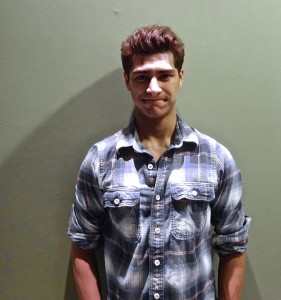
The presenters are all 11 grade students. The task was to deliver a presentation that was both meaningful and rich. Their theme, as is the theme of this TEDx event is a Catalyst for Change. 170 students delivered presentations. Of those, 9 were chosen through a combination of peer selection, performance quality and the teacher team.  Hosts: Ida Borjegren and
Hosts: Ida Borjegren and
Dan Borenstein
The Presenters are:  Sarah Lim – Rape: The misuse of the word rape by our society has not only trivialized its meaning, but has also contributed to the creation of rape culture. Our words are powerful and a symbol of freedom – it is our responsibility to use it for goodness and not to destroy others.–Sarah
Sarah Lim – Rape: The misuse of the word rape by our society has not only trivialized its meaning, but has also contributed to the creation of rape culture. Our words are powerful and a symbol of freedom – it is our responsibility to use it for goodness and not to destroy others.–Sarah
 Kun-Woo Song – How to Make Your Own Personal Army through Facebook (Effectiveness of Propaganda on Social Medias): We see propaganda in posters, history books, or even in advertisements. But with the introduction of social media, something we use everyday, propaganda is now in social media as well. Through this TED talk I will explain how and why propaganda is effective in social media.
Kun-Woo Song – How to Make Your Own Personal Army through Facebook (Effectiveness of Propaganda on Social Medias): We see propaganda in posters, history books, or even in advertisements. But with the introduction of social media, something we use everyday, propaganda is now in social media as well. Through this TED talk I will explain how and why propaganda is effective in social media.
Becky Bradley – Are we ‘Ableists’?: The objective of my FOA was to show how the language we use creates and reinforces our mental images and shapes meaning. Furthermore, my objective was to make the audience think about the language we use and how it affects others. Ultimately, I wanted the audience to leave the presentation knowing how to properly address people with disabilities and be more aware of language.
 Marcel Donatus – Gap Year: My presentation is on the merits of taking a gap year. In my presentation, I advocated for a mandatory gap year for every high school student and I also cleared common misconceptions people have on the gap year. I talked about how taking a gap year let students discover their passion and avoid being indecisive as they go to college. Since this is my junior year and graduation is just right around the corner, I thought that this topic would be appropriate to address
Marcel Donatus – Gap Year: My presentation is on the merits of taking a gap year. In my presentation, I advocated for a mandatory gap year for every high school student and I also cleared common misconceptions people have on the gap year. I talked about how taking a gap year let students discover their passion and avoid being indecisive as they go to college. Since this is my junior year and graduation is just right around the corner, I thought that this topic would be appropriate to address
 Jazz Burr – The Sad Side of Social Media: In our current culture, it’s not socially acceptable to admit that you’re not doing great, that life isn’t going so well. This is largely due to the constant flood of positive language on social media that masks people’s true problems. You will barely ever see someone post a depressing status, but the stream of statuses along the lines of “Just landed in [insert exotic location]” or “Enjoying drinks with friends” just never ends. The language used in social media has contributed to society requiring us to be “perfect” all the time.
Jazz Burr – The Sad Side of Social Media: In our current culture, it’s not socially acceptable to admit that you’re not doing great, that life isn’t going so well. This is largely due to the constant flood of positive language on social media that masks people’s true problems. You will barely ever see someone post a depressing status, but the stream of statuses along the lines of “Just landed in [insert exotic location]” or “Enjoying drinks with friends” just never ends. The language used in social media has contributed to society requiring us to be “perfect” all the time.
Sofia Meisburger – The Power of Public Speaking: 3 out of 4 individuals experience some degree of anxiety when verbally speaking to an audience; in contrast, very few people undergo discomfort through written speech. Where does this originate from? Is it nurture or nature that has brought about this seemingly innate phobia? It is acutely apparent through examples of Emma Watson, Martin Luther King Jr., Aristotle and Adolf Hitler. Spoken word is one of, if not the most important skill a person can develop. If the claim that fear of public speaking is due to a shared societal viewpoint and negligence of the emphasis of speech in an individual’s upbringing, the implementation of a mandatory course in rhetoric would change this fear dramatically. Normalizing something as vital and as powerful as public speaking from an early age through schooling has the potential to change the voice of our generation and generations to come like never before.
 Rigel Blatt – Introversion: My TEDx Talk is about how introversion affects the way people communicate and how introverts shouldn’t have to be in an environment where they feel pressured into expressing their ideas or feelings through clear verbal articulation.
Rigel Blatt – Introversion: My TEDx Talk is about how introversion affects the way people communicate and how introverts shouldn’t have to be in an environment where they feel pressured into expressing their ideas or feelings through clear verbal articulation.
 Marsha Niemeijer – Default: Very briefly, My TED Talk is about the lack of diversity (mostly focusing on racial diversity) in young adult literature and why it is important to have diversity in influential books aimed towards young adults.
Marsha Niemeijer – Default: Very briefly, My TED Talk is about the lack of diversity (mostly focusing on racial diversity) in young adult literature and why it is important to have diversity in influential books aimed towards young adults.


